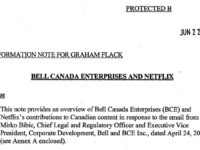The series on the Canadian digital tax debate continues with an examination of calls for mandated contributions by Internet video services to support the creation of Canadian content, frequently referred to as a “Netflix tax” (earlier post on digital sales tax). The Netflix tax is perhaps the most politicized digital tax issue, with both the Conservatives and Liberals opposing such a tax during the last federal election. Despite the opposition, the issue continues to resurface as it is regularly raised by cultural groups and was part of the CRTC’s report on the future of broadcast regulation released in the spring.
Proponents of a mandated Netflix contribution typically rely on three arguments: (i) failure to impose fees and regulation on foreign providers represents an “existential threat” to Canadian creative industries since they argue it will lead to reduced spending on production in Canada; (ii) there is a need to “level playing field” for Canadian services competing against foreign providers; and (iii) Europe is moving toward Netflix regulation and Canada should too.











